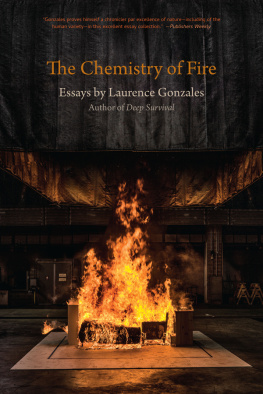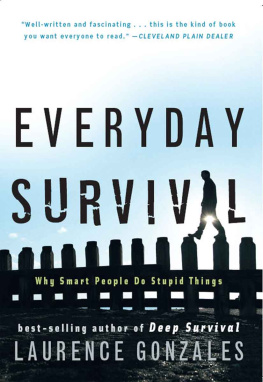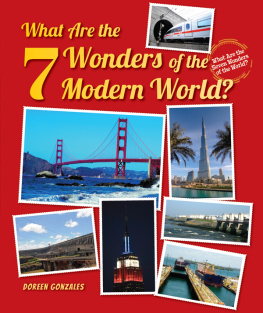Laurence Gonzales - Chemistry of Fire
Here you can read online Laurence Gonzales - Chemistry of Fire full text of the book (entire story) in english for free. Download pdf and epub, get meaning, cover and reviews about this ebook. publisher: University of Arkansas Press, genre: Detective and thriller. Description of the work, (preface) as well as reviews are available. Best literature library LitArk.com created for fans of good reading and offers a wide selection of genres:
Romance novel
Science fiction
Adventure
Detective
Science
History
Home and family
Prose
Art
Politics
Computer
Non-fiction
Religion
Business
Children
Humor
Choose a favorite category and find really read worthwhile books. Enjoy immersion in the world of imagination, feel the emotions of the characters or learn something new for yourself, make an fascinating discovery.
- Book:Chemistry of Fire
- Author:
- Publisher:University of Arkansas Press
- Genre:
- Rating:4 / 5
- Favourites:Add to favourites
- Your mark:
- 80
- 1
- 2
- 3
- 4
- 5
Chemistry of Fire: summary, description and annotation
We offer to read an annotation, description, summary or preface (depends on what the author of the book "Chemistry of Fire" wrote himself). If you haven't found the necessary information about the book — write in the comments, we will try to find it.
Chemistry of Fire — read online for free the complete book (whole text) full work
Below is the text of the book, divided by pages. System saving the place of the last page read, allows you to conveniently read the book "Chemistry of Fire" online for free, without having to search again every time where you left off. Put a bookmark, and you can go to the page where you finished reading at any time.
Font size:
Interval:
Bookmark:

Copyright 2020 by Laurence Gonzales. All rights reserved.
ISBN: 978-1-68226-151-4
eISBN: 978-1-61075-733-1
Manufactured in the United States of America
24 23 22 21 20 5 4 3 2 1
 The paper used in this publication meets the minimum requirements of the American National Standard for Permanence of Paper for Printed Library Materials Z39.48-1984.
The paper used in this publication meets the minimum requirements of the American National Standard for Permanence of Paper for Printed Library Materials Z39.48-1984.
Designed by Liz Lester
Cataloging-in-Publication Data on file at the Library of Congress
Johnny Winter first appeared in Playboy in December 1974; The Cult of War first appeared in Notre Dame Magazine in Summer 1989; Change Redemption first appeared in Mens Journal in May 1995; ValuJet Crash first appeared in Mens Journal in September 1996; Stealing Titanic first appeared in National Geographic Adventure in Spring 1999; Space Station first appeared in National Geographic Adventure in Fall 1999; Spring Opening first appeared in Mens Journal in Fall 1997; Hill Fever first appeared in National Geographic Adventure in October 2004; and Mount Washington first appeared in National Geographic Adventure in November 2004.
This book is dedicated to
Debbie, Elena, Simon,
Amelia, Terry, Jonas,
Emmett, Carolyn Claire,
Francis Henry,
and Annelise Carolyn
Your cowardice may keep
You from your assignation with my ghost,
The love you promised me when I was dust,
Not air. And yet I cannot even sleep,
I cannot die, but I will feel my ghost
Driven to find this orchard every year,
This picnic ground, and wait till everyone
Tires of the sundown, turns the headlights on,
To float them off like moths into the dark.
I will stand up to strip my hunger off,
And stare, and mumble, knowing all your love
Is cut beside my name on the white rock,
While you forget the promise and the year.
You sat beside the bed, you took my hands;
And when I lay beyond all speech, you said,
You swore to love me after I was dead,
To meet me in a grove and love me still,
Love the white air, the shadow where it lay.
Dear love, I called your name in air today,
I saw the picnic vanish down the hill,
And waved the moon awake, with empty hands.
JAMES WRIGHT, The Assignation
No one remembers. Even you, my brother,
summer afternoons you look at me as though
you meant to leave,
as though it never happened.
But I killed for you. I see armed firs,
the spires of that gleaming kiln
Nights I turn to you to hold me
but you are not there.
Am I alone? Spies
hiss in the stillness, Hansel,
we are there still and it is real, real,
that black forest and the fire in earnest.
LOUISE GLCK, Gretel in Darkness
WHEN MONROE COUPER and Erik Lattey left Harvard Cabin in Huntington Ravine, the weather was not bad, considering that they were on Mount Washington. The temperature was in the teens, and the wind gusts ranged from forty to sixty miles an hour on the summit. The weather was forecast to hold, and since they didnt plan to go to the summit, they werent worried. They were going to climb a frozen waterfall known as Pinnacle Gully and be back at the cabin before dark. They decided to travel light and leave their larger overnight packs at the cabin.
Climbing magazine had recently published an article about an ascent of Pinnacle Gully, an exciting story of triumph over adversity, which had attracted a lot of climbers to that route. No one knows if Couper and Lattey had read it, but they were enthusiastic novice ice climbers and well may have. The story worried Mountain Rescue Service volunteers who felt that it might encourage people to push on beyond their abilities. Couper and Lattey thought of Pinnacle as an easy climb, a natural next step after the guided trips and climbs the two had completed during previous seasons. They were wrong.
While the two men were hiking up the broad and rugged trail toward Pinnacle, Alain Comeau, a leader with Mountain Rescue Service and a local guide, was taking a group up another trail. He saw fast-moving clouds on the horizon. As he said later, Ive been in the worst weather on Mount Washington. He knew how bad it could be. He started his group back down to seek shelter. Bill Aughton, director of search and rescue at the Appalachian Mountain Club, was also guiding that day. He was so impressed that he photographed the weather before turning his group around.
Comeau had guided Monroe Couper and had taught him ice climbing. Hed had a bit of experience before that, Comeau told me. He wanted tolearn to lead. He wanted to move off on his own. But the Pinnacle was not the right next step. Its a serious climb in a serious environment. A lot of people aspire to a climb like that. Technically he could have done it, maybe, on a good day in perfect conditions. But Pinnacle is a vertical ice climb and very technical. On a scale of one to five, this is a three plus. They had all brand-new gear, too, which tells you something.
As Couper and Lattey reached the base of the gully, they realized that in their rush to get started, they had forgotten their climbing rope. It was noon by the time theyd returned to Harvard Cabin, retrieved the rope, and left again to make the strenuous hike for the third time. After that, they would have been tired and therefore much more vulnerable to hypothermia. They definitely would have been sweaty when they started, Comeau said. And in this environment, its essential to stay dry.
They could have easily calculated that they no longer had the time to make the climb and descend before dark. They could have seen the weather moving in, as Comeau had. They could have recognized that leaving your rope behind is a sign of mental impairment. And even if all that evidence didnt deter them, they could have read the big yellow signs posted at the trailheads. They say, Stop. Then in smaller letters, The area ahead has the worst weather in America. Not some of the worst, but the worst. General Electric tested early turbojet engines on top of Mount Washington because of that. The notice continues unequivocally: Many have died there from exposure, even in the summer. Turn back now if the weather is bad.
Even without the posted warning signs, they could have looked up to see what Comeau and Aughton saw.
Couper and Lattey pressed on.

The mythology is that anyone can get up Mount Washington, if not to ski, then at least to stand on top and look around. Every year, many people do. But a beautiful day on Mount Washington can turn bitter so fast that most people cant imagine it. Theyve never seen or felt anything like it, so they dont have that true belief we get from direct experience. Like falling into icy water, it shocks and numbs and defeats people before they have a chance to think clearly. The first person to climb Mount Washington in winter conditions was also the first person to die there. In October 1849, Frederick Strickland, an English gentleman bent on experiencing the outdoors, began his climb.Ill-informed and ill-prepared, he succumbed to hypothermia, ripped off his clothes, and died short of the summit. Scores of people have died there. But death is only one measure of the hazards. For every body that comes back, dozens more have been injured or have suffered needlessly and have had to be rescued. As on Everest, some dead climbers have never been brought back.
Recently, I hiked up Tuckerman Ravine Trail on the first beautiful warm day of spring to see some of the half-million people who visit there each year. As I slogged up the steep, slippery slush in a dense forest of birch and pine richly floored with blowdown and the damage from ice storms, I was never out of sight of at least a dozen people on the switchbacks. The sun was warm, casting a cathedral light through the trees. I saw octogenarians in long johns and six-year-olds in high-tech, expedition-weight summit gear. There were snowshoes and no shoes and serious-looking people with ice-climbing gear. Everyone was grinning, joking, saying hi to strangers. It seemed utterly unreal that a day like this could turn nightmarish in a whiteout blizzard within a matter of minutes.
Font size:
Interval:
Bookmark:
Similar books «Chemistry of Fire»
Look at similar books to Chemistry of Fire. We have selected literature similar in name and meaning in the hope of providing readers with more options to find new, interesting, not yet read works.
Discussion, reviews of the book Chemistry of Fire and just readers' own opinions. Leave your comments, write what you think about the work, its meaning or the main characters. Specify what exactly you liked and what you didn't like, and why you think so.









